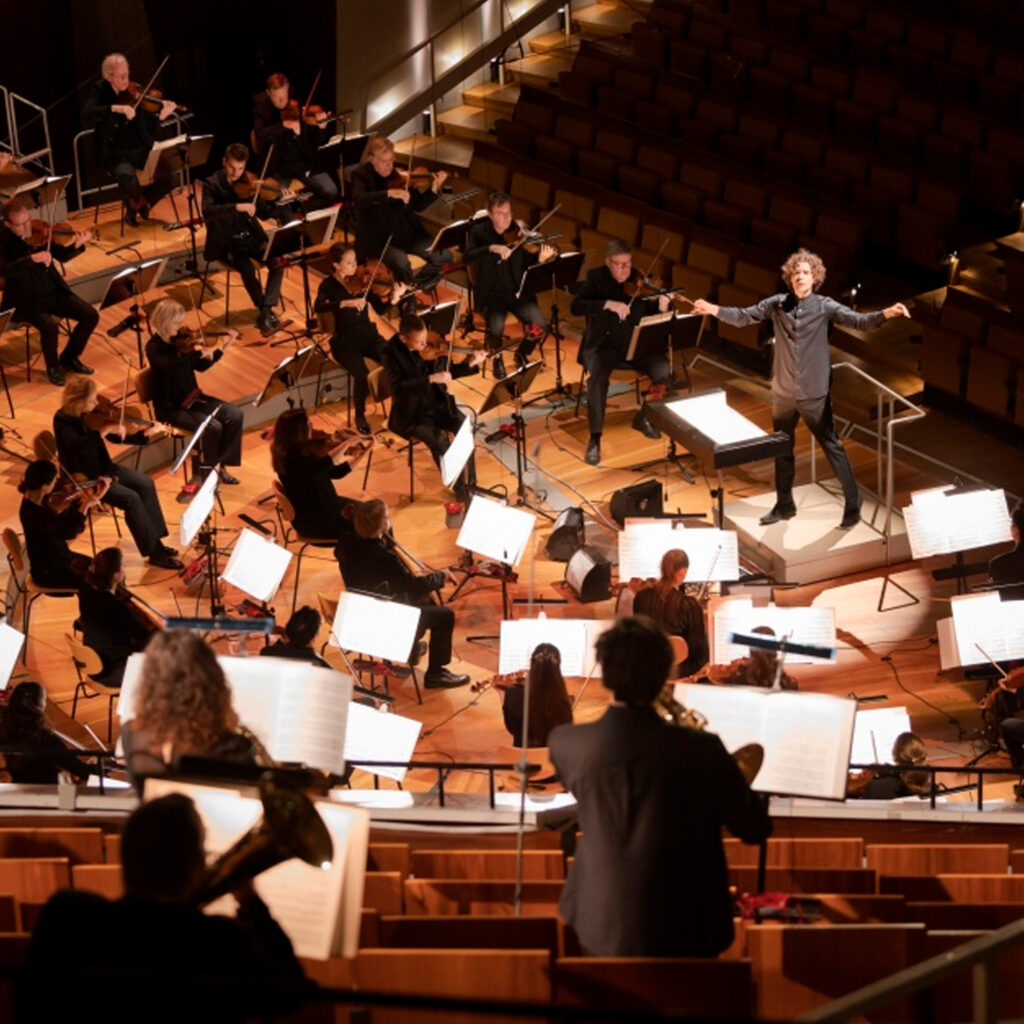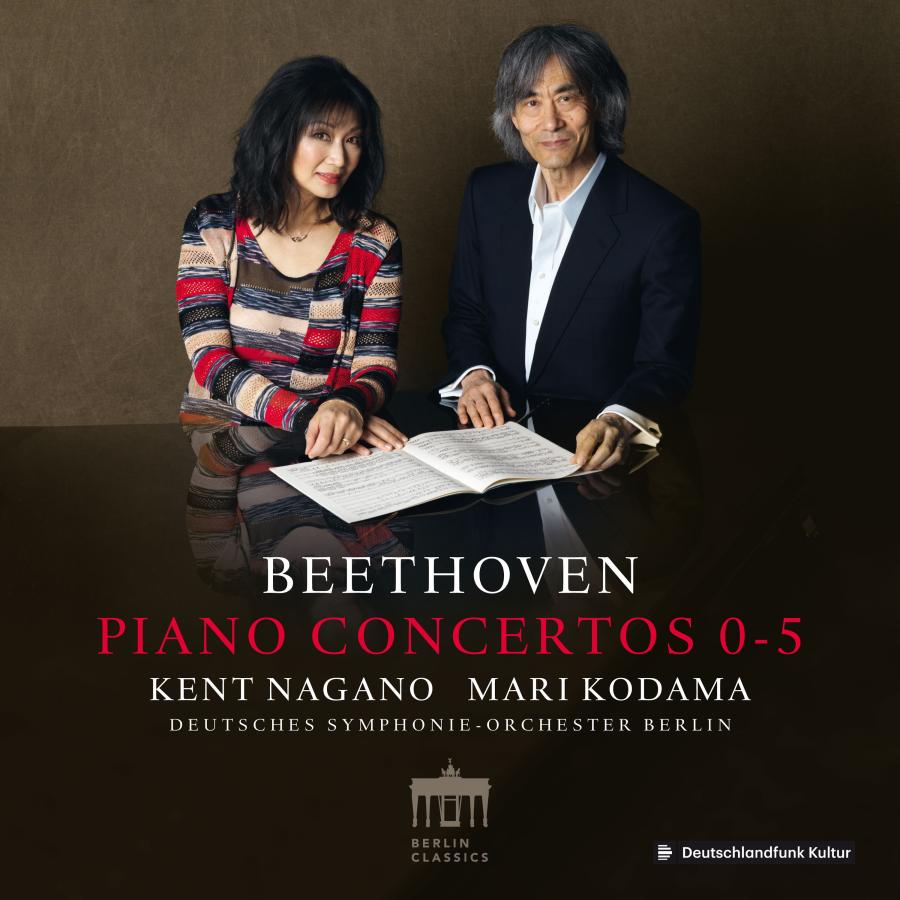The Deutsches Symphonie-Orchester Berlin celebrates its 75th anniversary in the 2021-22 season. Since it was founded in 1946, it has become recognised far beyond Germany – namely around the world. Famous music directors shaped the first seven decades of its history: Ferenc Fricsay, Lorin Maazel, Riccardo Chailly, Vladimir Ashkenazy, Kent Nagano, Ingo Metzmacher and Tugan Sokhiev. The association of many years with top-class guest conductors such as James Conlon, Manfred Honeck, Ton Koopman, Sir Roger Norrington, Sakari Oramo, Leonard Slatkin and David Zinman contributes to the orchestra’s renown, as does regular collaboration with Kent Nagano, now honorary conductor, and the other former music directors.
Robin Ticciati has headed up the DSO since September 2017. In the past seasons, he has demonstrated his versatility and flexibility with the orchestra with repertoire from the Renaissance to the present day, with presentation forms that range from unusual set-ups in the hall via lightning concepts to staged versions, and with exceptional projects like playing on gut strings and free improvisations. The anniversary in the 2021-22 season will be marked with concerts spanning a differentiated spectrum from classical to experimental formats and a birthday programme in November under Ticciati’s direction. As part of how the young Briton sees himself as Music Director, he places a particular focus on working with young musical talent. Against this backdrop he works intensively with the Ferenc Fricsay Academy Scholars, is active in opera projects for voice students, and will conduct the ‘Symphonic Mob’ for the fourth time.
An “orchestral think tank” is how the Süddeutsche Zeitung once underscored the DSO’s position among the capital city’s orchestras, alluding to the rich dramaturgy of the concert programmes, the commitment to contemporary music and a steady flow of repertoire discoveries—and to the courage to deploy unusual formats to convey and communicate music that continues to characterise the orchestra through the present day. For instance, for 14 years the DSO has been bringing art closer to the pulse of modern life with Casual Concerts hosted by the conductor, followed by a lounge. Since 2014 it has been holding the ‘Symphonic Mob’, bringing together music enthusiasts of all ages with musicians from its own ranks to form Berlin’s largest spontaneous orchestra. The DSO also provided innovative impulses with two international remix competitions, the concert projects ‘Ostinato’ and ‘Parallax’, presenting new symphonic forms at the nexus between orchestral music and live electronics in 2016 and 2017, and by collaborating with ensembles active on the independent music scene in the ‘Trikestra’ project. Within the last year, Robin Ticciati and the DSO created a series of extraordinary music films in coproduction with EuroArts Music International and sounding images, including a production at Berlin’s Club Sisyphos around Ondřej Adámek’s work ‘Dusty Rusty Hush’ and a filmic realisation of Strauss’ ‘An Alpine Symphony’ with philosophical commentaries of the legendary Italian mountaineer Reinhold Messner.
With its many guest performances, the DSO is present on the national and international music scene. The orchestra has performed in recent years in Brazil and Argentina, in Japan, China, Malaysia, Abu Dhabi and Eastern Europe, as well as at major festivals such as the Edinburgh International Festival, the Salzburg Festival and the BBC Proms. In autumn 2019, the orchestra conducted an Asia tour with Robin Ticciati, consisting of a residency in Tokyo and concerts in China, followed in 2020 by guest appearances, for instance in the Tonhalle Düsseldorf and in the Elbphilharmonie Hamburg. In the 2021-22 season, on the occasion of the DSO’s 75th birthday, they will go on an anniversary tour together with Leif Ove Andsnes, leading them to venues such as the Concertgebouw Amsterdam, the Müpa Budapest and La Seine Musicale Paris.
The DSO’s symphony concerts in Berlin’s Philharmonie are recorded by Deutschlandfunk Kultur, Deutschlandfunk and rbbKultur, and broadcast in Germany as well as via the European Broadcasting Union (Euroradio) all over Europe and beyond. A collaboration between ARTE Concert and rbb television for live broadcasts and later TV broadcasts has existed since 2013. Quite a few opera recordings from the Festival Theatre in Baden-Baden and from the Salzburg Festival are available as DVDs from Arthaus Musik. The DSO also has a global presence with numerous award-winning CD recordings. In 2011, it received the Grammy Award for the premiere recording for the production of Kaija Saariaho’s opera ‘L’amour de loin’ conducted by Kent Nagano. In recent years, Robin Ticciati and the DSO have already presented four highly acclaimed recordings with Linn Records with works by Bruckner, Debussy, Duparc, Duruflé, Fauré and Strauss. In September 2021, another recording will be released with Rachmaninoff’s Symphony No. 2.
Looking back at the history of the Deutsches Symphonie-Orchester Berlin brings to light no fewer than three names for one and the same orchestra. It was founded as the RIAS Symphony Orchestra by “Radio In the American Sector” in 1946. 20th-century music was firmly established in the programming from the start, in addition to interpretations of the classical repertoire characterised by transparency, structural concision and vividness. Once Radio Free Berlin (now Rundfunk Berlin-Brandenburg, rbb) began participating in the sponsorship of the orchestra in 1956, the ensemble was from then on called the Radio Symphony Orchestra Berlin (RSO). It has borne its current name since 1993; since the following year, it has been part of the Radio Orchestra and Choirs GmbH (ROC), which is supported by Deutschlandradio (40%), the Federal Republic of Germany (35%), the state of Berlin (20%) and Radio Berlin-Brandenburg (5%).
Photo: Peter Adamik




